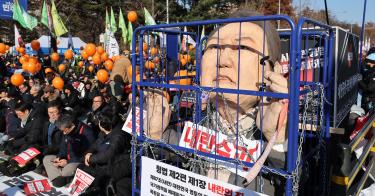South Korean President Yoon Suk Yeol’s misuse of his authority to declare martial law earlier this month has placed his nation in a constitutional crisis that will have a lasting impact on U.S. strategic interests across Asia just as Donald Trump returns to the White House.
Yoon’s martial law decree was quickly rescinded and South Korea’s constitutional system prevailed. But martial law is serious business, hardly the act of a mature, first-tier democracy, and South Korea’s reputation as a stable, regional partner has suffered.
Yoon invoked martial law against, as he described it, “anti-state forces” among his political opponents. But rather than a response to armed attack or domestic emergency, Yoon’s actions resulted from frustration with an obstructionist opposition party that enjoys a majority in the legislature.
>>> Seoul Can’t Shun Taiwan Contingency Responsibilities
Yoon’s debacle conjured images of South Korea’s dark authoritarian past with lingering questions of whether it could happen again. Doubts have now arisen over the stability of South Korea’s government; the country’s currency also plunged amid the ongoing political uncertainty. Most worrisome, there are concerns that North Korea might try to exploit the political turmoil to undertake greater military provocations against its neighboring foe.
South Korea’s parliament on Saturday impeached Yoon, a move that ended days of political paralysis but set up an intense debate over his fate.
Yoon’s presidential powers were suspended and Prime Minister Han Duck-soo, the country’s No. 2, took over presidential powers later Saturday.
Yoon’s entire cabinet resigned in protest to his martial law melee and his defense minister, Kim Yong-hyun, was arrested for treason. Yoon is now facing his own criminal treason inquiry—one that would be exempt from presidential immunity. Public opinion polls show 73% of South Koreans favor impeaching Yoon, whose approval ratings have fallen to a dismal 13%.
South Korea is now a nation in the midst of political chaos. No one is entirely certain who’s in charge of South Korea’s military or who’s responsible for responding to provocations from North Korea or other potential crises. In other words, who’s keeping Korea safe.
Back in 2016 President Park Geun-hye was sent packing for far less egregious corruption allegations after months of massive demonstrations. Yoon has done irreparable damage to his ability to carry out crucial foreign and security policies. There are many: strengthening South Korea’s alliance with the United States, implementing deterrence policies toward North Korea and China, working with Japan to boost security cooperation, and enhancing South Korea’s security and economic might within the Indo-Pacific region.
Faced with the prospect of ongoing impotence and inertia, South Korea is beginning to ask what’s next. The progressive opposition party would almost certainly win a special election to replace President Yoon. But the party would likely come into conflict with the U.S. as it resists American efforts for Seoul to assume a larger role against the encroaching Chinese threat. They would also act in opposition to the U.S. in regards to North Korea, reducing sanctions against Pyongyang in the hope of moderating the nation’s increasingly aggressive behavior.
>>> China’s Ambitions Are Endangering the Pacific Islands
Korean leaders such as Lee Jae-myung of the Democratic Party, have also questioned the relevance to South Korean security of China’s increasingly menacing posture against Taiwan. In July 2024, the South Korean opposition parties vowed to introduce legislation to prevent the South Korean military from intervening in a crisis over Taiwan. Washington, meanwhile, has pushed Seoul in the opposite direction, urging it to play a supporting role in any U.S. effort to defend Taipei.
The incoming Trump administration will look for ways to combat the dual threats posed by China and North Korea to the region. The White House will need allies that are both strong and reliable and will weigh their contributions accordingly. Until recently, both South Korea and Japan were seen as stalwart and dependable allies.
But Japan’s new Prime Minister Shigeru Ishiba leads a minority government with limited political clout, forced to make concessions to opposition parties for any legislative progress. As South Korea stumbles, there is now serious doubt about Tokyo’s ability to deliver on its own promises to double the nation’s defense spending, develop counter-strike capabilities against North Korean nuclear and missile threats, and help contend with China’s aggressions against Taiwan.
Coupled with the implications of President Yoon’s extra-constitutional activities, the United States is now allied with two foundering ships of state just as Washington begins to set up its own course in the Indo-Pacific region. As President Trump plots his first moves, the prospects for success are dimmer than just a few short months ago.
This piece originally appeared in the New York Post



